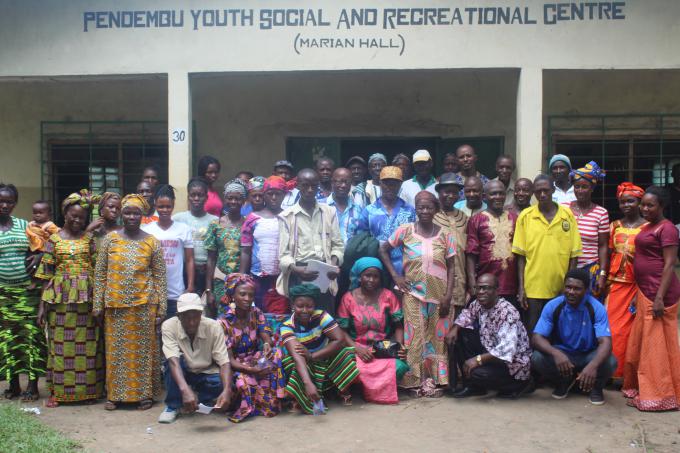COMMUNITY CONTRIBUTIONS IMPROVE EDUCATION OUTCOMES IN KAILAHUN DISTRICT

Photo credited by Jeremiah
By Jeremiah Sawyerr
On the 24th May, Ten School Me communities participated in the first annual experience learning event in Pendembu chiefdom, Kailahun district. Key representatives from the School Management Committees, Mothers clubs, Head Teachers and school supervisors in Kailahun district assembled in Pendembu to share experiences on implementation of School Improvement Plans (SIPs) and Community Action plans (CAPs) which were adopted by communities in 2017. The learning event was an opportunity for Save the Children and communities to take stock of progress made, share good practices and map the way forward. With an award given to the top 3 communities to serve as an inspiration to none performing communities.
In his opening statement Mohamed Lahun, Project Coordinator, School Me, expressed delight for the overwhelming participation of the communities as a sign of commitment to improving education for children.
Supported by Save the Children Korea, the School Me project is being implemented in 10 schools and communities in Kailahun district with the aim of providing equal access to safe and well maintained facilities and quality education for girls and boys. The project ensures community ownership and sustainability through the engaging them and building their capacity to resource, maintain and manage their schools to address drop-out. It also aims to provide improved quality education services in 10 primary schools.
In 2017 communities agreed to take ownership of their school development to set out SIPs and CAPs to complement government and Save the Children interventions to improve education outcome in their communities. As part of this process school supervisors from the Ministry of Education Science and Technology (MEST) facilitated and documented the CAPs community sessions.
Kailahun District School Supervisor Ambrose McCarthy, conveyed his appreciation of the event. He said that the Ministry of Education looked forward to learning about the progress made by the communities over the past year to contribute to development in tier schools. The MEST representative also stated that SCI strategy to improve education by allowing the communities to own and lead the process was a good approach for sustainability and referred to best examples as evidence that community ownership is the best strategy for development.
Reviewing progress made three communities; Talia community, Pombali section, Lawua chiefdom scored up to 70% accomplishment of their SIPs and CAPs. They have addressed the inadequate toilet facilities, fenced school playgrounds, and constructed additional classrooms in their respective community schools.
Representatives from Talia community showcased the commitment that the Mothers Club and SMC members have and achievements made. The SMC Chairman disclosed that the little money generated from the school, community contributions and income earned from sand mining was used to support school rehabilitation and construction.
“…our mothers and wives used their income earned from sand mining to finance the latrine construction. This shows that women are partners and can lead well when giving the opportunity. The women also funded the plastering of the crack walls” said Saffa Jusu.
Sengema Gao community also recorded similar progress in school improvement. They also reported formulating by-laws to address school dropout. As a result there has been an increase in school enrollment because a more conducive learning environment and supportive community systems which they feel will help them maintain the gains made.
“…to sustain our intervention, we have started community backyard farming. Proceeds from these garden will be used to support the running of the school since the school is not approved”, said Fatoma Kamara SMC Chairman.
Despite reports of successes, much needs to be done in the remaining communities lagging behind. SCI will continue to provide the support needed to ensure that all 10 communities succeed in making access to quality education for girls and boys a reality and achieving our overall goal which is to ensure that all children are educated.
 Sierra Leone
Sierra Leone